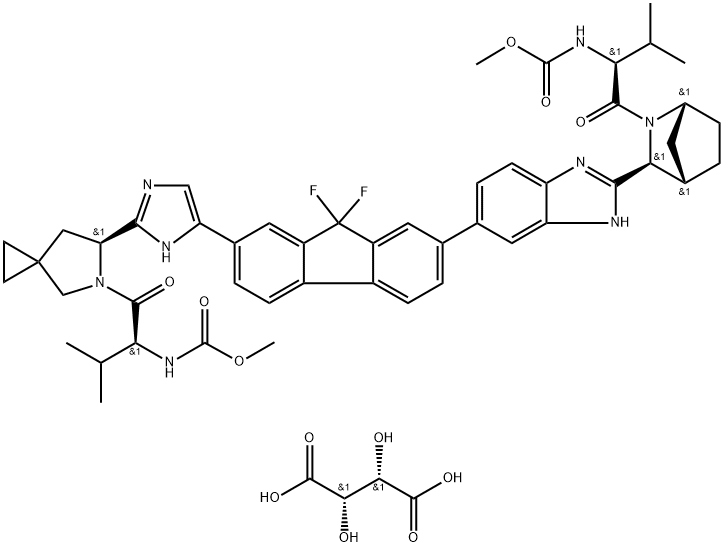Ledipasvir D-tartrate is an inhibitor of the hepatitis C virus NS5A, with EC50 values of 34 pM against GT1a and 4 pM against GT1b replicon.
Ledipasvir D-tartrate is an inhibitor of the hepatitis C virus NS5A, with EC50 values of 34 pM against GT1a and 4 pM against GT1b replicon.
In Vitro:Ledipasvir has GT1a and 1b EC50 values of 31 and 4 pM, respectively, and protein-adjusted EC50 values of 210 pM (GT1a) and 27 pM (GT1b) and the intrinsic EC50 of 39 is 310 fM for GT1a and 40 fM for GT1b. Ledipasvir is highly protein-bound both in human serum and in the cell-culture medium (containing 10% BSA) of the replicon assay[1]. Ledipasvir exhibits an EC50 value of 141 nM against the JFH/3a-NS5A replicon[2].
In Vivo:Ledipasvir is remarkable not only on the basis of its high replicon potency but also on the basis of its low clearance, good bioavailability, and long half-lives in rat, dog, and monkey and low predicted clearance in human. The pharmacokinetics of Ledipasvir is measured in rats and dogs. Ledipasvir shows good half-lives (rat 1.83 ± 0.22 hr, dog 2.63 ± 0.18 hr) in plasma, low systemic clearance (CL), and moderate volumes of distribution (Vss) that are greater than total body water volume[1].
References:[1]. Link JO, et al. Discovery of ledipasvir (GS-5885): a potent, once-daily oral NS5A inhibitor for the treatment of hepatitis C virus infection. J Med Chem. 2014 Mar 13;57(5):2033-46.
[2]. Hernandez D, et al. Natural prevalence of NS5A polymorphisms in subjects infected with hepatitis C virus genotype 3 and their effects on the antiviral activity of NS5A inhibitors. J Clin Virol. 2013 May;57(1):13-8.
